
Do you feel like your relationship is stuck in a cycle of miscommunication or unresolved conflict? You’re not alone. Many couples reach a point where they feel disconnected from one another. But there’s hope— couples therapy offers a supportive space to rebuild trust, improve communication, and rekindle emotional intimacy. Whether you’re facing trust issues or simply want to strengthen your relationship, couples therapy in Tigard can help you reconnect with your partner and work together to build a stronger, more fulfilling relationship.
Improving Communication Skills
Communication is at the heart of every successful relationship, but it’s also one of the most common areas where couples struggle. Over time, misunderstandings, unspoken frustrations, or poor listening habits can create distance between partners. That’s where couples therapy can make a transformative difference.
The National Library of Medicine presented data that showed “the average person receiving couple therapy is better off at termination than 70%–80% of individuals not receiving treatment—an improvement rate that rivals or exceeds the most effective psychosocial and pharmacological interventions for individual mental health disorders. Source.
In therapy, couples are introduced to effective communication techniques that allow them to express their needs, feelings, and concerns in a way that fosters understanding rather than conflict. One of the core skills learned is active listening—the ability to fully focus on your partner’s words without interrupting or forming a rebuttal in your mind. Couples also learn how to use “I” statements to express emotions without assigning blame, a technique that reduces defensiveness and keeps conversations productive.
For example, instead of saying, “You never listen to me,” couples are encouraged to reframe the statement as, “I feel unheard when we’re not connecting.” This subtle shift in language can completely change the dynamic of a conversation, paving the way for more open and honest communication.
Expert Tips
- Tip 1: Practice Active Listening Outside of Conflict
“One of the most effective communication tools is practicing active listening during everyday conversations, not just during disagreements. This helps both partners feel more connected and heard in the relationship, building a solid foundation for when conflicts do arise.” – Angelie Karabatsos - Tip 2: End of the day check-in
“Ask – ‘tell me something interesting about the day’ instead of “how was your day.” This allows connected sharing and reunion so each partner can share feelings and provides an opportunity to lead into other discussions that can avoid conflicts.” – Angelie Karabatsos - Tip 3: Use ‘I’ Statements to Foster Understanding
“A key to reducing defensiveness in communication is using ‘I’ statements. Instead of saying, ‘I feel neglected when this happens.’ This subtle shift can make a big difference in how conversations unfold.” – Angelie Karabatsos
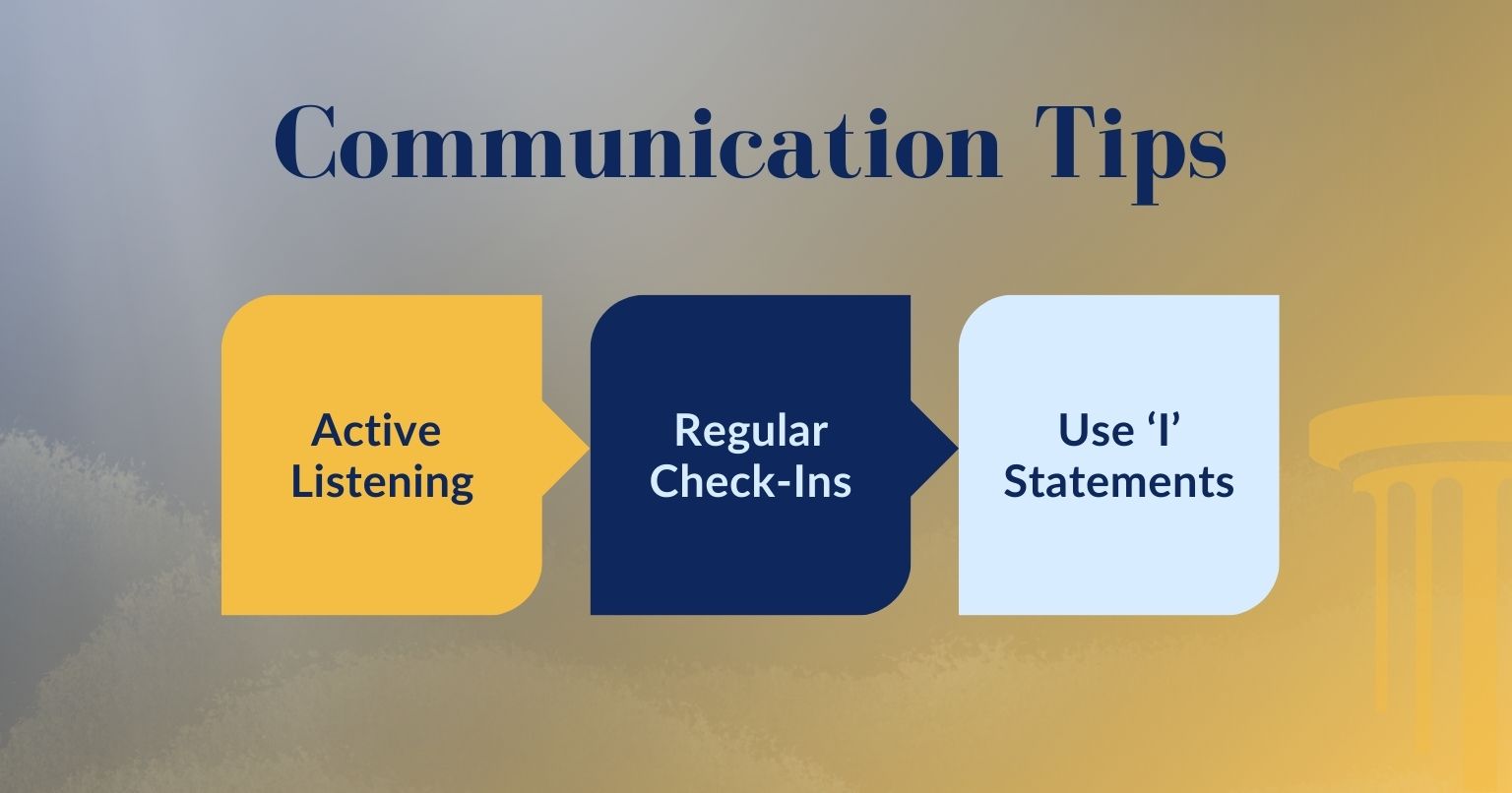
At Pillars of Hope Counseling in Tigard, couples work together to develop these skills in a supportive and non-judgmental environment. Over time, these techniques help break down barriers and allow partners to communicate more clearly, reducing misunderstandings and strengthening their emotional connection.
Rebuilding Trust
Trust is the foundation of any strong relationship, but once it’s broken, it can feel almost impossible to repair. Whether due to infidelity, dishonesty, or emotional neglect, a loss of trust often creates deep emotional wounds that are hard to heal. Fortunately, couples therapy provides a safe and structured environment for rebuilding that trust step by step.
According to a study published in the Journal of Marital and Family Therapy, “Therapists revealed poor communication, closeness/independence, responsibility, control issues, and trust/jealousy as the top five issues for couples seeking treatment.” Source.
In therapy, couples learn how to confront the issues that caused the breach in trust without blaming or shaming one another. A key part of the healing process is open communication, where both partners are encouraged to express their feelings honestly and without judgment. This is often done through guided exercises that foster emotional vulnerability and transparency, helping couples to reconnect on a deeper level.
One effective technique is transparency exercises, where partners commit to being completely open about their actions and intentions. For example, if trust was broken due to secrecy, couples might agree to share more about their daily activities or feelings, creating an environment of honesty that allows trust to gradually rebuild.
Expert Tips
- Tip 1: Transparency is Key to Rebuilding Trust
“Trust can be rebuilt by committing to complete transparency. For couples who have experienced a breach of trust, small but consistent acts of openness—like sharing daily plans or feelings—help re-establish a sense of security over time.” – Angelie Karabatsos - Tip 2: Focus on the Process, Not Just the Outcome
“Rebuilding trust isn’t about rushing to fix things; it’s about engaging in the process. Both partners need to focus on taking small, daily actions that rebuild trust gradually, rather than expecting immediate results.” – Angelie Karabatsos - Tip 3: Emotional Vulnerability Leads to Healing
“Couples who are willing to be emotionally vulnerable with each other—sharing fears, regrets, and hopes—tend to rebuild trust more effectively. It creates a deeper connection and helps both partners feel safe and understood.” – Angelie Karabatsos
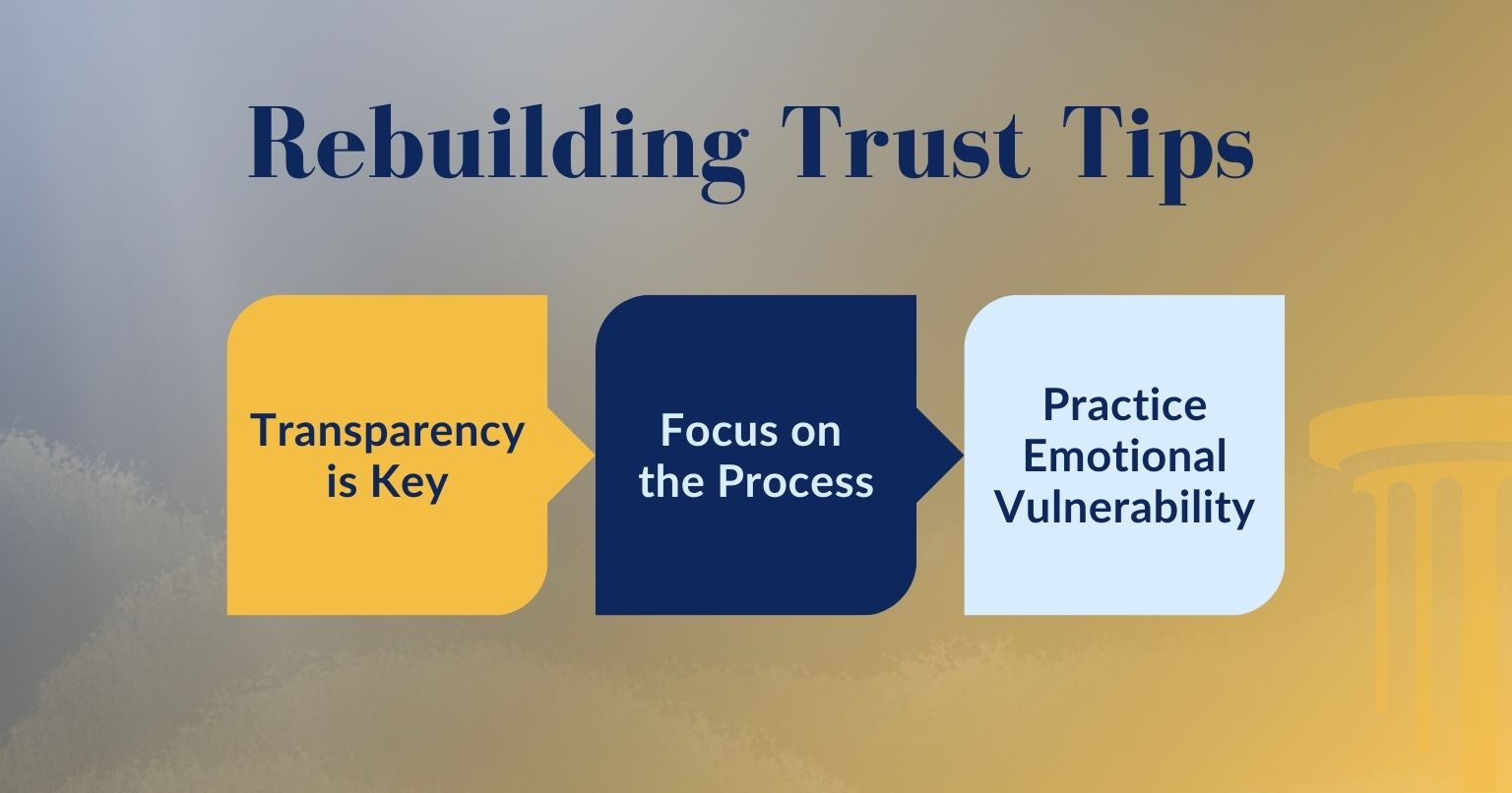
At Pillars of Hope Counseling in Tigard, couples facing trust issues are guided through this process with compassionate support. This allows them to address the root causes of mistrust and work together toward rebuilding their bond.
Resolving Conflicts Constructively
Disagreements are inevitable in any relationship, but how couples handle those conflicts often determines the long-term health of their partnership. In many cases, unresolved conflicts can spiral into more significant issues, causing resentment, frustration, and emotional distance. This is where couples therapy offers valuable tools to help resolve conflicts constructively.
According to a study published in the National Library of Medicine, “problem-solving skills and constructive conflict resolution strategies were positively associated with partner satisfaction, while destructive strategies were negatively associated with it.” Source
In therapy, couples learn how to approach disagreements, focusing on understanding and problem-solving, rather than blame or avoidance. One powerful technique introduced in therapy is de-escalation—learning how to pause heated arguments before they escalate into hurtful words or actions. Couples also work on identifying patterns of behavior, like stonewalling or defensiveness, that hinder productive communication. Empathy is a natural de-escalation tool. Couples learn how to provide empathy even when they feel misunderstood.Another key aspect of conflict resolution in therapy is learning how to compromise. Therapists help couples navigate differences in opinion by guiding them toward mutually acceptable solutions. This helps partners feel heard and respected, making it easier to resolve issues without leaving one person feeling defeated or dismissed.
Expert Tips
- Tip 1: Pause Before Responding
“In the heat of an argument, taking a moment to pause and breathe before responding can prevent escalation. It allows both partners to reflect on their words and react more thoughtfully, reducing the risk of saying something hurtful.” – Angelie Karabatsos - Tip 2: Approach Conflict as a Team
“One of the most effective mindsets is to approach conflict as a team, not as two opponents. Couples are taught how to work in partnership to create a shared solution to tough problems. Shifting the focus to solving the issue together promotes unity and helps prevent feelings of alienation.” – Angelie Karabatsos - Tip 3: Set Boundaries Around Arguments
“It’s important to set boundaries for how and when to argue. For instance, agreeing not to bring up sensitive topics when tired or stressed can prevent unproductive arguments. Scheduling time to discuss important issues helps couples resolve them calmly.” – Angelie Karabatsos
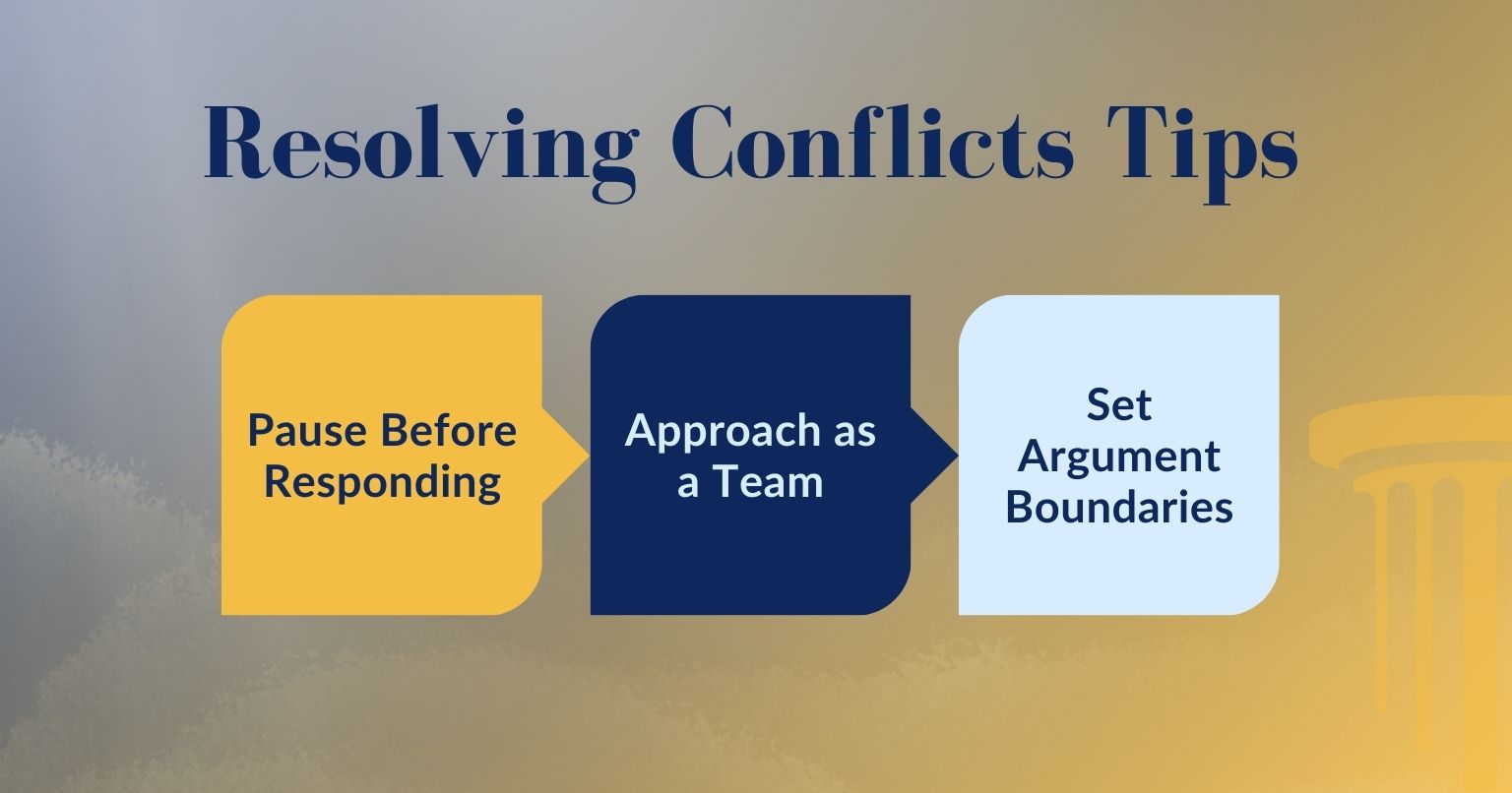
At Pillars of Hope Counseling in Tigard, couples have a supportive space to practice these conflict resolution strategies, helping them build healthier ways to approach disagreements in their everyday lives.
Strengthening Emotional Intimacy
Emotional intimacy is the glue that holds relationships together, but it’s also something that can fade over time if it isn’t nurtured. Many couples find themselves feeling emotionally disconnected, even if they still care deeply for one another. Couples therapy provides a space to reignite this emotional closeness by encouraging partners to be more vulnerable and open with each other.
According to Psychology Today, “emotional intimacy is linked to longer, healthier lives. Emotionally intimate partners are more likely to feel ‘in sync’ with each other, align their goals, and work together toward a shared future. This sense of partnership not only enhances the relationship but also contributes to individual well-being.” Source.
In therapy, couples are guided through exercises designed to foster empathy, understanding, and emotional connection. These exercises often involve sharing personal feelings, fears, or hopes in a safe, supportive environment where each partner can listen without judgment. By doing this, couples begin to break down emotional walls and rebuild a sense of trust and intimacy.
One technique frequently used in couples therapy is guided self-disclosure, where each partner is encouraged to share something deeply personal that they may have kept hidden. This process helps both partners feel more connected and understood. Over time, this practice of emotional openness becomes more natural, helping to restore intimacy in the relationship.
Expert Tips
- Tip 1: Make Time for Emotional Check-Ins
“I always encourage couples to schedule regular emotional check-ins. These don’t have to be long conversations, but taking time each week to ask each other, ‘What strengths do we see for our relationship?’ helps to maintain emotional closeness.” – Angelie Karabatsos - Tip 2: Practice Vulnerability in Small Steps
“Emotional intimacy is built through vulnerability, but for many couples, it can be scary to open up. Start with small disclosures—sharing something personal or discussing a fear. As this becomes easier, emotional intimacy deepens naturally.” – Angelie Karabatsos - Tip 3: Show Empathy, Not Just Sympathy
“Empathy is about truly understanding your partner’s emotions and making them feel seen. Instead of saying, ‘I’m sorry you feel that way,’ listen for the emotion and then provide empathy. A few examples are, ‘That sounds rough’ and ‘That must have felt disrespectful.’ This shift helps create deeper emotional bonds.” – Angelie Karabatsos
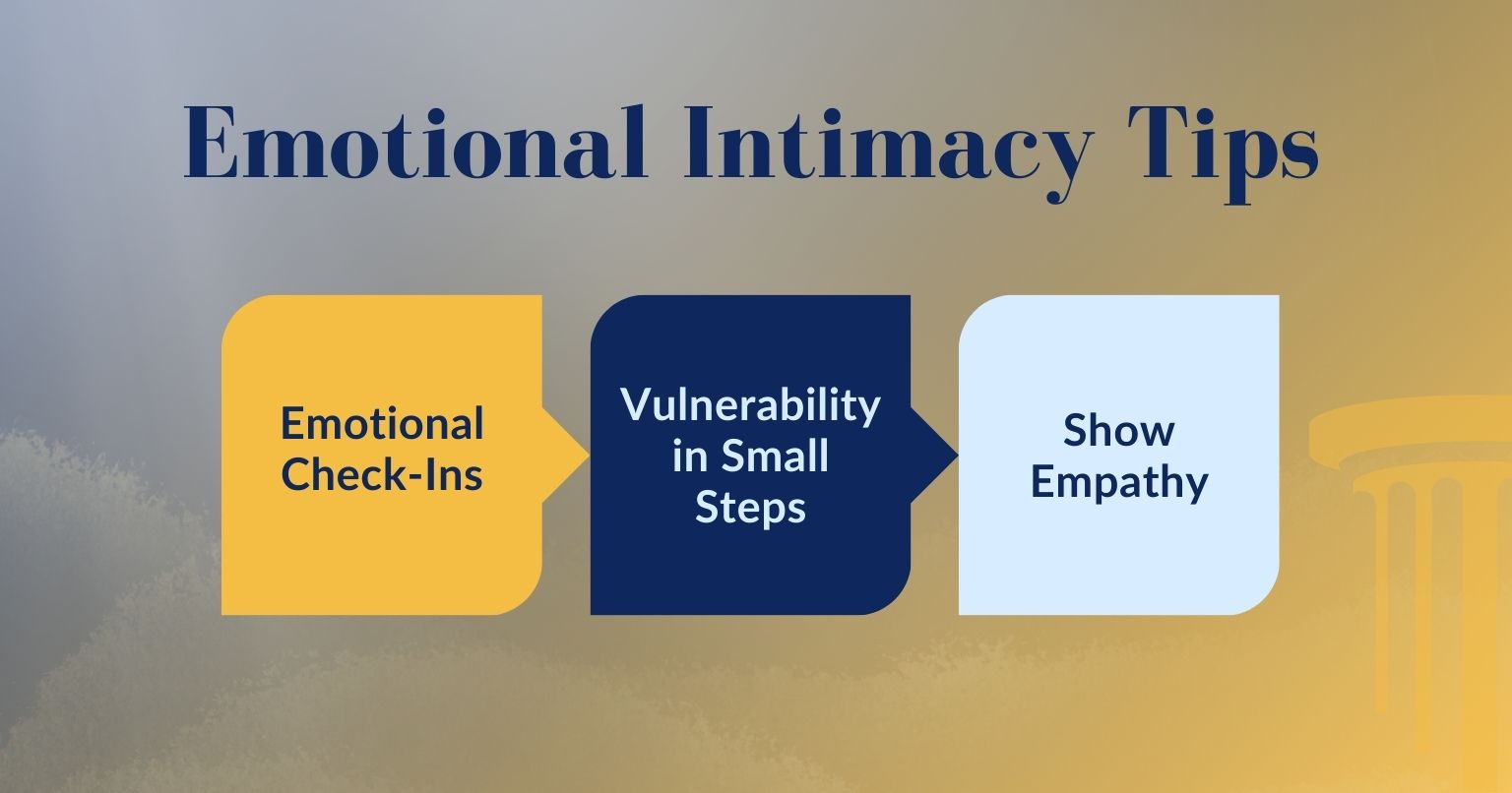
At Pillars of Hope Counseling in Tigard, couples work with Angelie Karabatsos to rediscover their emotional bond, ensuring that their relationship grows stronger and more connected through the therapy process.
Creating a Shared Vision for the Future
A strong relationship isn’t just about resolving present-day conflicts or improving communication—it’s also about looking forward together. Couples therapy helps partners align their goals, values, and dreams, creating a shared vision for the future that both can work toward. Whether it’s family planning, career goals, or simply strengthening the relationship, therapy provides the tools to help couples shape a future they both feel excited about.
In therapy, couples are encouraged to discuss their long-term goals openly. These conversations may focus on parenting styles, financial planning, or shared hobbies and passions. For many couples, these discussions can be challenging, especially if they have differing views. A skilled therapist helps facilitate these conversations in a way that fosters mutual understanding and compromise, ensuring that both partners feel their voice is heard.
One common technique used in therapy is future-oriented questioning, where couples are asked to imagine their ideal life together five or ten years from now. This process strengthens their connection and helps clarify the steps they need to take to make that vision a reality.
Expert Tips
- Tip 1: Set Time Aside for Goal-Setting Discussions
“I always recommend that couples schedule dedicated time to discuss their future goals. Whether it’s financial planning, family decisions, or personal aspirations, having these conversations regularly helps ensure both partners are on the same page.” – Angelie Karabatsos - Tip 2: Embrace Flexibility in Your Plans
“While it’s important to have a shared vision, flexibility is key. Life can change unexpectedly, so being open to adjusting your goals as a couple helps you stay aligned, even when the unexpected happens.” – Angelie Karabatsos - Tip 3: Focus on Small, Achievable Steps
“When creating a future together, it’s easy to get overwhelmed by big, long-term goals. I recommend using SMART goals to break them down into smaller, manageable steps that you can work on together. Each small success strengthens the relationship and brings you closer to the bigger picture.” – Angelie Karabatsos
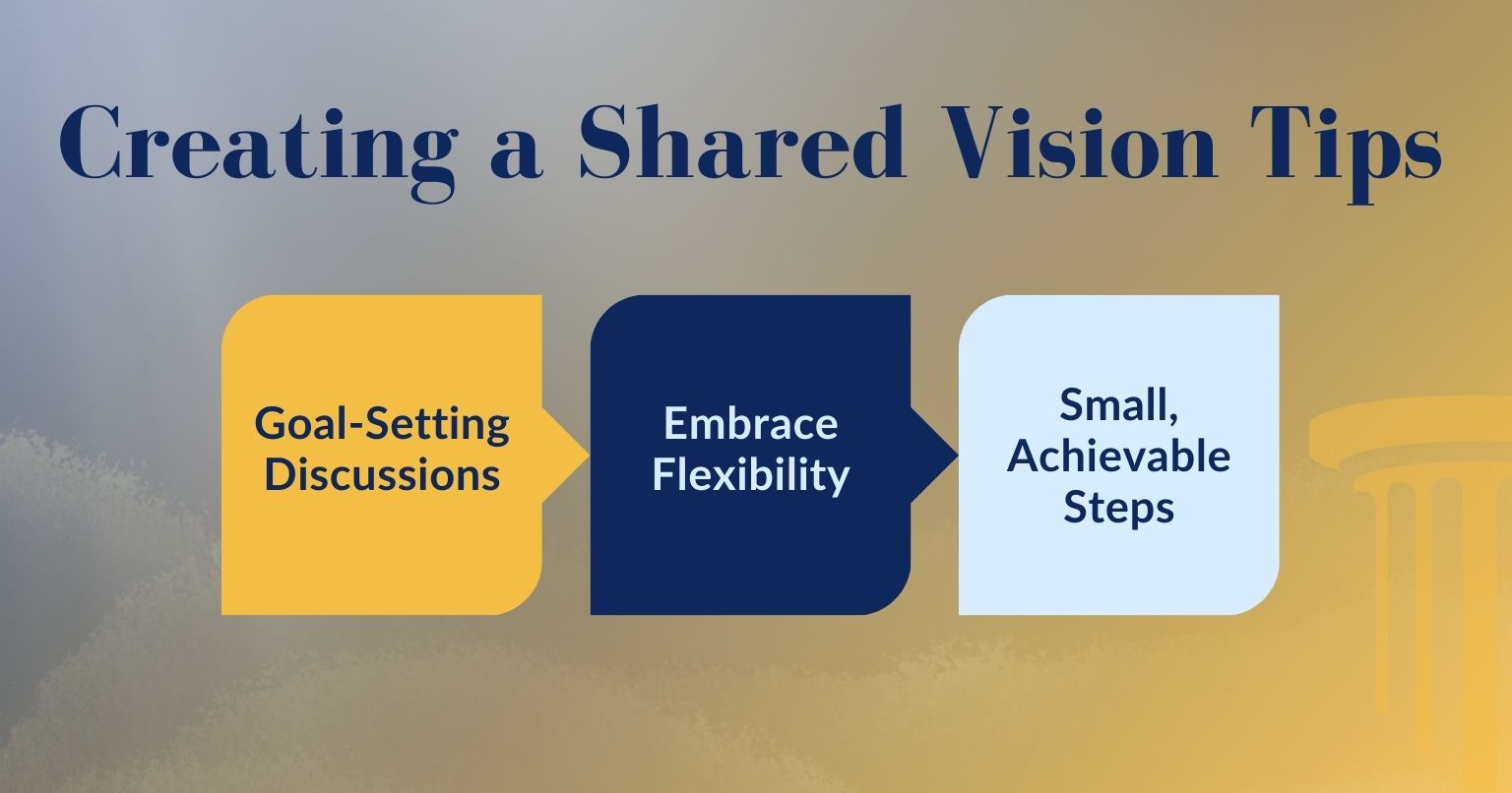
At Pillars of Hope Counseling in Tigard, couples work with Angelie Karabatsos to build a solid foundation for their future, focusing on alignment in key areas of their lives and learning to navigate any differences with compassion and compromise.
10-Step Checklist to Strengthen Your Relationship at Home
Here’s a practical, 10-step checklist couples can follow at home to strengthen their relationship. Each step encourages communication, emotional connection, and teamwork—perfect for couples looking to enhance their bond outside of therapy.
1. Set a Weekly “Relationship Check-In”
- What to Do: Every week, set aside 30 minutes for a marriage meeting (or CEO meeting). During this meeting, couples review schedules, discuss any hurts, repair those hurts, and end with a positive affirmation for their partner.
- Why It Works: Regular communication about the relationship helps you both stay connected and address small issues before they grow.
2. Practice Active Listening During Conversations
- What to Do: The next time your partner speaks, focus fully on what they are saying without interrupting or thinking of your response. Place cell phones out of sight and on silent or vibrate mode to stay fully engage with your partner.
- Why It Works: Active listening makes both partners feel heard and valued, which can prevent misunderstandings.
3. Plan a Date Night (Even at Home)
- What to Do: Plan a dedicated date night once a week. It can be something simple like cooking together or watching a movie, but make sure it’s time spent just for the two of you.
- Why It Works: Quality time strengthens emotional connection and creates positive memories.
4. Share One Thing You’re Grateful for Every Day
- What to Do: Each day, tell your partner one thing you appreciate about them, no matter how small.
- Why It Works: Expressing gratitude daily reinforces positive feelings and reminds you both why you value the relationship.
5. Work on a Shared Project or Hobby
- What to Do: Pick a project or hobby to do together, such as cooking a new recipe, gardening, or taking a class.
- Why It Works: Working toward a common goal builds teamwork and offers new opportunities to connect.
6. Use “I” Statements to Express Feelings
- What to Do: When discussing sensitive topics, use “I” statements to express your feelings (e.g., “I feel upset when…”).
- Why It Works: This approach allows partners to be open to hearing what is being said and be fully engaged in the conversation.
7. Set Goals Together for the Future
- What to Do: Have a conversation about your shared goals for the future, whether it’s related to finances, family, or personal growth.
- Why It Works: Having a shared vision for the future strengthens your bond and gives both partners something to work toward together.
8. Practice Empathy in Everyday Interactions
- What to Do: The next time your partner shares something difficult, respond with empathy rather than advice. Acknowledge their feelings and show understanding.
- Why It Works: Empathy deepens emotional intimacy and helps your partner feel supported and understood.
9. Take Time to Cool Off Before Resolving Arguments
- What to Do: Take a 20-minute break to cool off. If either or both partners are still not ready to talk, extend it to another two hours. If still not ready, table the discussion for 24 hours – but do not avoid each other during the cool-off period.
- Why It Works: This approach prevents escalation and helps both partners address conflicts calmly and thoughtfully.
10. Celebrate Each Other’s Successes
- What to Do: Take time to celebrate your partner’s achievements, no matter how small. Acknowledge and praise their wins.
- Why It Works: Celebrating successes reinforces positive feelings in the relationship and builds mutual support.
Conclusion
Building a strong, healthy relationship takes effort, but it doesn’t have to be overwhelming. You and your partner can nurture your bond and enjoy a deeper, more fulfilling connection by incorporating simple yet effective habits—like regular check-ins, active listening, and practicing empathy. Whether you’re looking to improve communication, rebuild trust, or create a shared vision for the future, small, intentional steps can make a big difference.
Couples therapy can provide the tools and guidance needed to strengthen the relationship if experiencing stuck feelings or looking for additional support. At Pillars of Hope Counseling, we offer personalized, compassionate couples therapy to help you and your partner overcome challenges and grow closer together.
Take the next step toward a healthier, more connected relationship today by booking a consultation with Angelie Karabatsos at Pillars of Hope Counseling in Tigard. Whether you’re just starting your journey or need help navigating difficult times, we’re here to support you every step of the way.